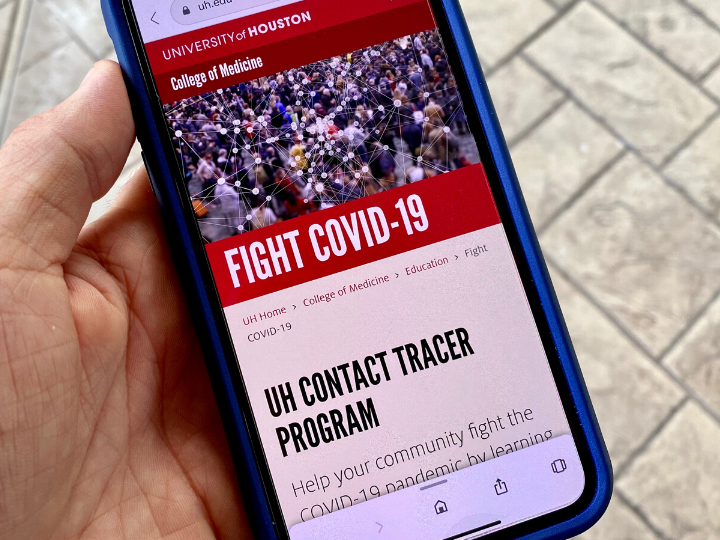
To help reduce community spread of COVID-19, the University of Houston College of Medicine has launched an online contact tracing certificate program for anyone around the world interested in becoming a “disease detective.”
“Population Health During a Pandemic: Contact Tracing and Beyond” is available to the public for free on Coursera until July 31, after which there will be a fee to receive a certificate upon completion. The 22-hour course aims to prepare a new type of public health worker uniquely educated about COVID-19 and broadly trained to identify and alert individuals who have potentially been exposed.
Since May 11th, UH has offered a separate free contact tracing certificate program for students, faculty and staff. So far, more than 2,200 members of the UH community have registered and over 1,000 have completed the Epi Corps (Epidemiology Corps) program, designed in collaboration with the Houston Health Department and Harris County Public Health.
“We were thrilled with the level of interest our contact tracing course had within our own UH community, but as a public institution committed to serving the broader world – especially during this crisis – it is important to offer an expanded class to the general public,” said LeChauncy Woodard, course co-organizer and professor at the College of Medicine. “We want to arm people with the knowledge to truly make a difference in this fight against COVID-19.”
Contact tracing – along with social distancing, stay-at-home mandates, wearing masks and good hygiene practices – is a core public health strategy being used by public health systems across the country to combat COVID-19. Contact tracers work with COVID-19 patients to recall everyone they’ve had close contact with leading up to their infection and then notify those contacts of their potential exposure – connecting them with health care systems while providing education, support and information to understand their risk.
Over 100,000 trained contact tracers could be needed across the country to address COVID-19, according to a report by Johns Hopkins University, while other medical experts have predicted even more need.
“Contact tracing is a tried-and-true approach to dealing with public health crises and this will help get us through the crisis until a vaccine is ready,” said Bettina Beech, course co-organizer and professor and associate dean for research at the College of Medicine. “Health care experience is not required to become a contact tracer. However, it’s critical to have good communication skills and cultural humility. We’ll cover it all in this comprehensive class.”
The UH contact tracing course is divided into 13 sections or “modules” and participants will learn to:
- Identify the signs, symptoms, modes of transmission and epidemiology of COVID-19
- Characterize underlying risk factors experienced by vulnerable groups that are predisposed to COVID-19 and available resources for high-risk communities
- Describe the drug development process, clinical trial phases and current COVID-19 vaccine candidates
- Describe the purpose of contact tracing, the context in which it is conducted and identify challenges and effective communication strategies
After July 31, the public can still take the course at no cost by enrolling in the audit option, without receiving a certificate upon completion. The course can be taken for $49 to receive a certificate.
To learn more or sign up for “Population Health During a Pandemic: Contact Tracing and Beyond,” visit the College of Medicine website.